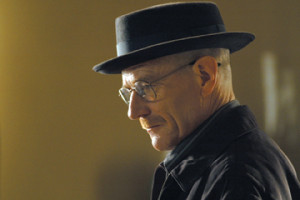
Warning: This story contains spoilers.
After five seasons and 62 episodes, AMC’s critically acclaimed show, “Breaking Bad,” aired the series finale, “Felina,” Sunday night.
The show, which premiered in 2008, told the story of Walter White (Bryan Cranston), a chemistry teacher who is diagnosed with terminal cancer and turns to cooking and selling methamphetamine to pay his medical bills and financially support his pregnant wife and son.
By the end of the series, Walt is by no means a hero.
What started for Walt as a small drug operation grew into him becoming the notorious meth producer known as Heisenberg.
By season five, Walt has multiple murders under his belt, the DEA after him, and has alienated his family and partner, Jesse Pinkman (Aaron Paul).
There were many fan predictions about what the final episode would bring. Between the cancer and the life of crime, viewers expected Walt to die, but did not know exactly how it would happen.
Vince Gilligan, the show’s creator, appeared in “Talking Bad” that aired following the finale and discussed the significance of the episode.
“In some cases unanswered questions are good, but in this case, in a finite and closed-ended show, we needed resolution,” he said. “The Sopranos ending, I thought, was great. I thought it was perfect for that show. This story was finite all along. It’s a story that starts at A and ends at Z. It’s a very closed-ended thing.”
The finale did tie up certain loose ends. Before he died, Walt was able to right some wrongs.
Walt saw his estranged wife, Skylar (Anna Gunn), and finally gave her the truth she wanted to hear, that his drug involvement was for himself, not for the benefit of
his family.
“I liked it. I was good at it. I was alive,” Walt confessed in the dramatic scene.
He was able to complete the task he set out to achieve in the first season, to leave his family financially secure, which he achieved by blackmailing his former partners into leaving his children a trust since he could not give them the money directly.
He even took out the Nazi gang who took the life of his brother-in-law and DEA agent, Hank, with a machine gun rigged to his car.
Over the past five seasons, Walter’s manipulative relationship with his lab partner and former student Jesse Pinkman deteriorated and left Jesse seeking revenge in the second half of the fifth season.
While some predicted that Walt would kill Jesse in the finale, he showed one last shred of humanity and saved him by shielding him from gunfire and even took a fatal bullet in the process.
Paul commented on Jesse’s state before Walt’s final good deed, saying “there’s not a soul in him anymore, and [Walt] decides that he deserves a second chance, so he dives on him. He throws himself in front a bullet for him — and it’s kind of beautiful.”
Walt’s death has been inevitable since the first season, when he underwent chemotherapy to treat his lung cancer, so it’s not a surprise that he died in the finale.
The final scene showed Walt bleeding out on the floor of the meth lab.
In the end, Walt’s life of crime did not pay off, seeing as he died alone after losing most of his fortune.
The final episode aired one week after the show won the award for Best Drama Series at the Emmys.
Fans mourning the end of “Breaking Bad” can look forward to still seeing one of the characters.
Netflix recently acquired the spin-off series centered around shady lawyer, Saul Goodman (Bob Odenkirk), called “Better Call Saul.”








